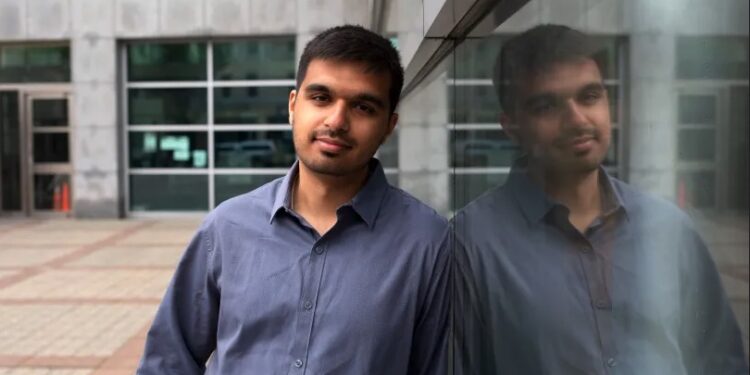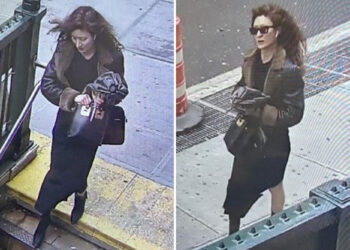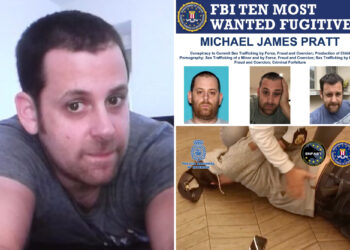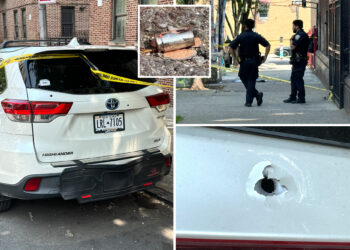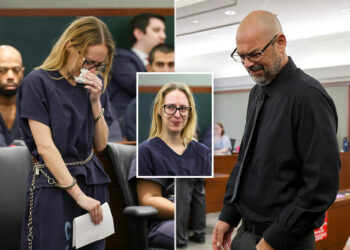This article was originally published on by THE CITY
When 22-year-old Aaron Narraph Fernando was selected as a grand jury foreman at the Queens Criminal Supreme Court in January, he was given a state court–issued handbook that detailed the work of the 23-member civilian voting body.
It instructed jurors that they would sit through witness testimony and review evidence by a prosecutor, and then “discuss with each other the evidence and the legal instructions” before voting on whether or not there is probable cause to indict each felony suspect.
Before it was presented with its first case, however, one court officer allegedly told Fernando’s grand jury behind closed doors that it should avoid “long debates” and should “not discuss the case” during deliberation, except to ask “clarifying questions.”
The next day, a second court officer allegedly instructed the grand jurors that they “were not supposed to state [their] opinions or get into back-and-forth or heated debates” before voting — and said “the judge who gave him his grand jury training had instructed him as such.”
These allegations, unveiled in an affidavit written by Fernando and submitted to court earlier this month, could have tainted the grand jury’s decisions in roughly three dozen cases they heard over four weeks in January.
Only prosecutors and the judges who oversee them are supposed to give legal guidance to grand jurors. Court officers doing so was unusual, unethical and possibly even illegal, according to a law school professor and a defense attorney who learned about these allegations from THE CITY.
Fernando’s affidavit — a sworn statement of facts punishable by perjury if false — was submitted as part of a motion to dismiss by a defendant who is now incarcerated on Rikers Island awaiting trial after being narrowly indicted by Fernando’s grand jury.
Giving Legal Advice
Grand jury proceedings are supposed to be secret, to prevent indictment decisions from outside interference, and to protect people from having their reputations smeared before they are even potentially charged.
But that shroud of secrecy also means that the court in effect oversees itself, with little outside accountability.
“The question becomes, if any of this is true, how long has this been going on in terms of months, years, decades?” asked Mark Bederow, a criminal defense lawyer and former Manhattan prosecutor.
Bennett Gershman, a Pace Law School professor and expert on trial error and prosecutorial misconduct, called Fernando’s allegations “very troubling.”
It appeared, he said, that the court officers had provided “substantive instructions” to the grand jury — a duty reserved only for prosecutors and the judges who are supposed to oversee them.
“The court officers are going way outside of their function,” Gershman told THE CITY. “It’s irregular. It’s improper.”
Court officers have “very limited responsibilities,” he said, and are mostly in charge of the safety, security, convenience and comfort of the grand jury and others in the courthouse.
Laws referenced in the handbook also state that “the grand jury may not seek or receive legal advice from any other source” other than a prosecutor or judge.
But the jurors were “very deferential” to the court officer’s procedural instructions, Fernando told THE CITY. He recalled facing pushback from his peers during the grand jury’s first deliberation session, as he was “trying to set some standards” for the discussion’s workflow based on the jurors’ handbook.
“I’m thinking, how we can do this is that I’ll read the charges, and if anyone wants to say anything, we can give folks a chance to say their thoughts on the case,” Fernando recalled. “And immediately I get pushback from people who were like, ‘No, we can’t do that, because the court officer said we can’t.’”
The grand jury never deliberated at length, Fernando added, since “people didn’t have interest in doing that … because folks thought they weren’t allowed to discuss the case.”
At one point, one juror even told Fernando that they “felt they could not discuss” concerns about a case openly because of the court officer’s instruction, the affidavit noted.
Fernando said he felt deterred from expressing his concerns and opinions even as he had doubts about bringing charges in roughly a quarter of the cases presented.
There are “some real problems that we should be talking about, and we’re being told that we’re not supposed to do that,” Fernando, who identifies as a democratic socialist and is applying to law schools, told THE CITY.
Patrick Cullen, president of the New York State Supreme Court Officer Association, declined to comment on the allegations, or the training court officers receive more generally. He said his union “does not comment on matters involving individual members” due to policy.
Lucian Chalfen, a spokesperson for the New York State Unified Court System, said grand jurors “aren’t required to discuss or argue the case amongst themselves.”
“The grand jurors on the panel were complaining about him,” Chalfen told THE CITY, referring to Fernando, “not the officers.”
Chalfen did not respond to repeated follow-ups about whether the courts consider it appropriate for officers to instruct grand jurors to “not discuss” cases, or about the training court officers receive.
“As the allegations are the subject of an affidavit submitted in support of a motion presently pending before the court, we cannot comment further at this time,” Chalfen said.
Seeking Accountability
A day after the grand jurors were instructed by a court officer “not to discuss” on their first case, a second court officer reiterated that they “were not supposed to state [their] opinions or get into back-and-forth or heated debates” during deliberations, according to Fernando’s affidavit.
Fernando then sought to clarify the court officers’ instructions with a prosecutor — the grand jury’s legal advisor.
Fernando approached Queens Assistant District Attorney Danielle Catinella just before she began to present the grand jury with its next case, to ask where the second court officer’s instructions were written in the law.
Catinella “replied that she would give me an answer before we deliberated on this case,” Fernando recalled in his affidavit. She did not return with an answer until at least two weeks after Fernando’s question, according to the affidavit, when she next appeared before the grand jury to continue her presentation.
At that point, Catinella told Fernando that “she was ‘not going to comment’ on anything the court officer had told the grand jury,” according to the affidavit — and only advised that grand jury discussions “must be ‘civil.’”
The grand jurors’ handbook states that “where necessary or appropriate, the court or the district attorney, or both, must instruct the grand jury concerning the law with respect to its duties or any matter before it.”
Gershman, the legal ethics expert, charged that the prosecutor should have told the court officers to cease and desist from offering procedural instructions, or otherwise bring the foreman’s concerns to the judge.
“The court officers have absolutely no place there,“ Gershman said, arguing that their instructions might have “compromised” the proceedings.
“And if the prosecutor doesn’t step in and make that very clear, then the prosecutor in the Queens’ District Attorney Office is violating the rules. And there should be some accountability here,” he said.
A spokesperson for the Queens District Attorney’s Office said, “We are looking into the issues raised in collaboration with the stakeholders.
“It would be premature to come to conclusions about the allegations a grand juror has made until those allegations are fully investigated or litigated,” the spokesperson said. “Additionally, state law protecting the confidentiality of grand jury proceedings constrains us from discussing any particulars at this time.”
Warden Trouble
The court officers, however, doubled down on their instructions after Fernando had raised his concern to Catinella, according to the affidavit.
Ten minutes after Catinella’s first appearance, which came just after Fernando had approached her, two court officers escorted Fernando to the grand jury warden’s room reserved for high-ranking court officers, the affidavit alleged, and “admonished” the foreman for seeking clarification from the prosecutor — adding that “asking such questions on the record could get them into trouble” and that “the matter ‘would go all the way up.’”
The two court officers were acting “very exasperated,” Fernando recalled, and their guns and handcuffs were visible as one of them “went on a tirade.”
“From what I can tell, they were really afraid that they were gonna get in trouble,” Fernando told THE CITY. “I don’t know what she was trying to do, it seemed like she was definitely trying to intimidate me or figure out why I did that. Again, I really was just like, ‘I just asked a question, I don’t know what the big deal is.’”
Chalfen, the courts spokesperson, confirmed in an email that Fernando “was spoken to by two officers assigned to GJ [grand jury] about his behavior.”
Fernando said he filled in other jurors about that exchange just after it happened. They pressed him to defer to the court officers.
“I’m pretty scared at this point. I don’t know what’s gonna happen,” he added. “And the jury’s confused too. …Some people were sympathetic, but a lot of people were just like, ‘Just drop it, we know what you’re trying to do, but just drop it, whatever. Let’s just listen to what they’re all saying.’”
Due Process Violation?
One criminal defense attorney whose client had been charged by this particular grand jury filed a motion last week to dismiss the indictment, based on Fernando’s affidavit.
The attorney Sean McNicholas, who is also a former prosecutor at the Queens DA office, told THE CITY that his client’s case “particularly sounded a little off and a little strange” — and that the grand jury was supposed to be “in the authority of a safeguard position to make sure there’s nothing outrageous going to trial.”
But the grand jury’s proceedings would all be proven a “spectacular failure” if Fernando’s allegations are substantiated, said Bederow. It would suggest an “egregious due process violation,” he added.
“Any indictment that is secured in that manner has no integrity at all, and ought to be dismissed,” Bederow told THE CITY.
The case which Fernando’s affidavit was attached to, specifically, involved an alleged car dealership robbery attempt, where a salesman accused defendant Ronald Evans of displaying a homemade knife and announcing a robbery, McNicholas said. But the attorney also noted that Evans had supposedly been carrying “a lot of cash on his person” already for the purpose of his road trip from Maryland to New York — a long Uber ride to visit his ailing grandmother.
“Now, my client brings up a very valid point: How do you rob a car dealership?” McNicholas raised, adding that dealerships are not cash-operated businesses.
Evans later insisted that he deliver testimony before the grand jury — the only defendant to do so during the term — which, according to the affidavit, left Fernando with “several unanswered questions and concerns about the fact pattern and the defendant’s mental state.”
Fernando faced pushback from his peer jurors, who referenced the court officer’s instructions, as he attempted to raise his concerns. The jury then “narrowly voted” to indict Evans, according to the affidavit.
Evans is currently incarcerated in an infirmary care facility on Rikers Island awaiting trial, as McNicholas said his family has been unable to post his $50,000 bail.
“From what I know is that if you’re indicted, it’s going to be one to two years on Rikers waiting for your trial,” Fernando said. “Our decision does make a gigantic difference, because even before they go to a trial jury, who knows what could happen in the meantime? They could die on Rikers.”
Fernando added that he had been passionate about the idea of participating in the grand jury’s civic duty — but was ultimately disappointed that the proceedings lacked much meaningful deliberation.
“I was just asking folks to raise their hands and marking down the result and handing it over for four weeks — like signing indictments with people who I’ve never met, and who might spend their next couple years on Rikers Island,” he recalled. “That was the part that really killed me, too. It was soul-crushing to have to sign my name on each one.”
Fernando has lost sleep, he said, wondering if the grand jury had done its due diligence.
“It felt wrong,” he said. “It felt really wrong.”
THE CITY is an independent, nonprofit news outlet dedicated to hard-hitting reporting that serves the people of New York.


